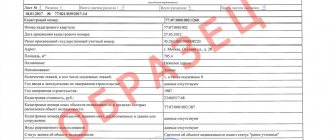How to check out with rent arrears?
So, is it possible to check out of an apartment with debts? To begin with, it is worth noting that the accounting of apartment debts for housing and communal services is carried out not by the migration service, but by the housing organization. But the practice is that most citizens turn specifically to the housing organization, which is authorized by law to accept applications for registration and discharge from the relevant residents. However, housing organization employees do not discharge citizens.
Contacting the housing organization regarding this issue is not mandatory. Thus, any citizen can directly contact the relevant department of internal affairs with an application or request an extract through the state portal for providing services to the population.
The procedure for discharge through the passport office is as follows:
- you need to go to the relevant department of internal affairs (OVD) with your passport;
- you must fill out the application form in the prescribed form and submit it to the employee;
- within three days, and usually immediately, an employee of the passport office will put a note on the extract in the passport and enter the relevant information into the registration data.
The procedure itself is simple, but there are certain difficulties associated with the work of the department itself. So, he accepts registration questions on certain days and it is not a fact that on this day it will be possible to get through the live queue. Usually passport offices are overly busy and sometimes submitting a simple application can be difficult.
For this reason, it is recommended to register online. This can be done through any government services terminal, which are usually located in bank branches.
If you do not want to stand in line, then it is enough to submit an electronic application for an extract through the Internet portal of public services. To do this, you will need a scanned copy of your passport and an authenticated account on the portal.
The procedure is as follows:
- in the search column you need to enter the name of the corresponding service;
- after the field for submitting an application opens, you only need to indicate the reason for the statement, because the rest of the information for identified users is filled in automatically;
- it is necessary to indicate the code of the department that should consider the application;
- upload a scan of your passport.
Such applications are reviewed within a day. After the answer arrives, you can go to the passport office with the original passport to get an extract stamp out of turn.
It is highly discouraged to contact a housing organization, as it is interested in ensuring that residents pay off their debts as quickly as possible. For this reason, they can withhold the application themselves without transferring it to the passport office, thereby preventing them from checking out of the apartment with a debt.
Even if you had to contact the housing office, if such difficulties arise, it is worth reminding the relevant employee that deliberately delaying the discharge will be considered as arbitrariness. After all, the law establishes a separate procedure for collecting debts for housing and communal services, which is not related to the presence or absence of registration.
You can register at a new address without extracting from the old one
If you are asking yourself the question, can I check out of the apartment if I have a debt, then, firstly , why check out at all?
If you want to register at your place of residence in any city (district) of the Russian Federation, this is done regardless of whether or not you have a permanent place of residence, without first deregistering at your previous place of residence, if you had one.
If a passport or other identification document is lost or inaccessible, registration at the place of stay until a new passport is issued is carried out only on the basis of a personal statement.
The rules allow you to register at a new place of residence without first extracting from your old one and obliges the authority that will register you to contact the place of your previous registration and send there a notification about the need to discharge you (clause 5).
The documents required for registration are a general civil or foreign passport of a citizen of the Russian Federation, the USSR, for children - a birth certificate and a document that is the basis for moving in.
A departure slip or a stamp in the passport about the discharge is not required for this. This stamp must be affixed to your passport at the same time as the release stamp from your previous passport officer at your new place of permanent residence on the day you submit your registration documents.
The procedure for registration and deregistration from the previous place of residence must be fully completed within three days from the date of submission of documents (in some cases - within eight days).
If you intend to be discharged with minor children, or to be discharged separately, this method of discharge is the only one possible.
The document providing the basis for moving in does not need to be presented if it is in the possession or is available to the compulsory medical insurance.
Such a document is clearly at their disposal if you are moving in under a rental agreement already concluded with the compulsory medical insurance, a certificate of your ownership of the apartment registered with the local registration authority.
For the same reason, in paragraph 31, subparagraph “a” of the Rules, you are again suggested that if you want to deregister due to registration at a new place of residence, write an application about this to the registration authority at your previous place of residence and submit it in person or send it in the form electronic document (certified by electronic signature).
You are not required to provide documentary evidence that you will actually register at the new place of residence indicated in the application.
What will happen to the debts
Housing and communal services debts will not disappear on their own after discharge. Only the debtor can disappear. Housing legislation quite precisely establishes the circle of persons who have an obligation to make payments for housing and communal services, which includes the former tenant.
Thus, these include the following subjects:
- Persons living in the corresponding apartment under a social tenancy agreement. The obligation to pay arises at the moment of conclusion of such a contract and ends at the moment of termination.
- When providing persons with housing from a special fund by agreement. Here the obligation is valid for the entire period of validity of such an agreement.
- Tenants of housing in public funds or in private law relationships. Here, the existence of an obligation depends on the terms of the contract, but if nothing is specified in the contract on this matter, then the obligation is considered to arise from the moment of its conclusion.
- A participant in a cooperative organization for the construction and maintenance of housing from the moment of its acceptance into the membership. In this case, the obligation arises directly from the date specified in the relevant order of the governing body or official. In exceptional cases, such an obligation may arise at the time of immediate move-in of persons into the relevant apartment.
- The owner of the apartment from the moment when the corresponding agreement was concluded on the transfer of this housing into his ownership and other grounds for the emergence of ownership rights.
- For persons receiving apartments from the developer, the obligation to pay housing and communal services arises after the official transfer of housing. This moment is recorded in the acceptance certificate, which is possible only after the issuance of permission from the authorized body to put the relevant building into operation.
- If, upon completion of construction work, some apartments were not transferred to the residents or the corresponding acceptance certificate was not drawn up, then the obligation to pay housing and communal services is assigned to the developer himself. In most cases, the developer himself continues to perform the functions of a housing organization, so no problems arise.
Meanwhile, the law establishes the obligation to pay housing and communal services on time and in full. The payment time is established by the relevant agreement between residents and the housing organization. Typically, payments for housing and communal services must be paid no later than the 5th day of the month following the reporting month.
But what happens if the person is discharged, but the debts remain?
We recommend that you read:
Cases of eviction from an apartment for non-payment of utilities
The debt for an apartment is classified by law as indisputable. That is, a person cannot object to such a debt. The housing organization simply submits an application for an order to the relevant judicial authority, after which the debt will be collected through bailiffs.
When considering this issue in court, the participation of the debtor himself is not necessary. But if the debtor does not agree with the amount of the debt or with the accrual of certain payments for housing and communal services in general, then there is a way to challenge the order.
Litigation is always difficult. For this reason, the housing organization tries not to bring the case to court, but simply put pressure on the residents at the time of discharge by refusing, withholding the application, and so on.
However, the law recognizes such actions as arbitrariness, since the above-mentioned order for the collection of these debts is provided. Therefore, you can safely file a complaint with the police and other supervisory authorities regarding such actions of the housing organization.
Can bailiffs remove debts on an apartment if I am not the owner?
If you are a relative of the owner, then: 292 of the Civil Code of the Russian Federation. Members of the owner’s family living in the residential premises belonging to him and limited by the court in legal capacity are jointly and severally liable with the owner for the obligations arising from the use of the residential premises.
We recommend reading: Kosgu Split System Installation
If not a relative, then the clarification of the Supreme Court of the Russian Federation: “The obligation to make timely and full payments for utilities is borne not only by the owner of the residential premises, but also by citizens living together with the owner in the residential premises belonging to him, who, along with the owners, are consumers of utilities - a legal portal that provides free online consultation with lawyers. You can read legal advice, useful articles, download sample documents and ask a question to a specialist.
What is the impact of the statement and debts for housing and communal services?
Before you check out of your apartment, you need to think about the consequences. If the law does not tie the extract and registration at another address to housing and communal services debts, then the presence of debts may become an obstacle to other legal actions. For example, most social subsidies and tax benefits are provided in the absence of debts for housing and communal services. In addition, the consequences of such debts can be:
- judicial liability of the debtor;
- financial sanctions from the housing organization;
- the emergence of relationships with bailiffs;
- problems when obtaining a loan and so on.
The presence of debts on an apartment causes difficulties when selling. So, if the buyer does not agree to accept the apartment along with the debts, then they will need to be repaid. Of course, this will have a certain impact on the cost of the transaction if the buyer nevertheless agrees to the purchase.
After discharge, the person will no longer be able to live in the corresponding apartment. In addition, if the apartment is state-owned, then after discharge the person loses the right to participate in free privatization. This, of course, does not mean that such a person will not be able to privatize other public housing, but in relation to this apartment his powers will be terminated.
In addition to this circumstance, a person may encounter administrative problems. Thus, the law establishes that after discharge a person must register at a different address within a week. If this does not happen, then he is brought to administrative responsibility. Responsibility is imposed in the form of a monetary fine.
The amount of the fine for violating registration deadlines differs depending on the locality. So, if in Moscow and St. Petersburg the amount of such a fine can be 5–7 thousand, then in other cities it is 2–5 thousand rubles.
Do debts affect check-out?
Citizens often wonder whether their debts for an apartment can affect their release from it. Here it is worth turning to the main legislative act in force in Russia - the Constitution. According to its article 27, everyone whose presence in the state is legal has the right to free movement, as well as choice of place of stay and residence.
There is no need to register specifically. It is enough to obtain a permanent registration at the new place of residence, and the citizen will be discharged from the previous one at the same time, since it is impossible to have two permanent registrations at the same time. But sometimes it is still necessary to check out if permanent registration in another housing is not expected in the near future.
What to do if you have no money
Of course, if a person does not have money to pay for housing and communal services, then he can only count on mutual understanding from the housing organization or assistance from the state.
As for mutual understanding with the housing organization, it is expressed in debt restructuring, if one has not previously been carried out. So, in order to somehow ease the burden, you need to do the following:
- contact the housing organization with an application for deferment or installment payment;
- agree on a payment plan for several months or agree on an exact date for repaying debts;
- if necessary, you must indicate your new residential address upon checkout so that a trusting relationship can be established with the housing organization.
Of course, it is best to pay off the debt immediately and forget about it forever. But if you don’t have cash, then you still shouldn’t take out loans because of utility debts.
The possibility of debt restructuring in this area is enshrined directly in housing legislation, so each tenant has the right to request that this rule be applied to him.
In addition, residents can count on assistance from the state. Thus, from the budget funds of the corresponding regions, low-income citizens can receive compensation for paying for housing and communal services. However, for this you need to have a residence permit in the appropriate housing and, if possible, not have debts.
If the residents are already recognized as low-income and the debt arose after this fact, then it is possible to pay off the debts using the allocated subsidies. The law provides for the targeted use of these funds to pay for utilities, so transfers at the expense of debts will not be considered a violation.
We recommend that you read:
Limitation period for housing and communal services payments
The worst course of action is to avoid meeting with representatives of the housing organization. As already mentioned, utility debts are classified as undisputed and the debtor’s participation in court proceedings is not at all necessary. So the trial can take place without the debtor’s knowledge, and the bailiffs will knock on his door.
It is worth noting that utility companies always meet debtors halfway. If you don’t have the funds to pay off your debts, then you don’t need to be afraid to go straight to the housing organization and say so directly. Utility companies are interested in the debtor paying off the debts sooner or later, so they can give a large amount of time as a deferment.
Will they be released from the apartment if there is a debt?
Modern realities are such that citizens may find themselves in serious debt captivity: bank consumer loans, mortgages, late payments for utilities.
Despite the financial burden, no one can prevent you from changing your place of residence (a right guaranteed by the Basic Law of the Russian Federation) and leaving any living space :
- dormitories;
- municipal housing;
- privately owned apartments;
- square meters purchased under the mortgage lending program.
A citizen must clearly understand that registration on the territory of the Russian Federation does not depend on the financial status and presence of debts. The concept of “notification nature” is legislatively assigned to this legal norm.
Unfortunately, the procedure for discharge from an apartment “with aggravated consequences” may be accompanied by subjective decisions of the hostel commandant or an employee of the housing department’s passport office. Ultimately, you will be released from the previous square meters, but this will take a lot of nerves and time.
Let's look at the common practice of refusing to deregister due to debt. Taking advantage of legal illiteracy, the passport officer of the management company can deny a citizen his constitutional right to freedom of movement.
The arguments of this side sound like this: “we won’t write it out until you pay your debts.” The position is understandable in everyday life: the housing department defends its financial interests. From a legal point of view, this is arbitrariness, falling under an administrative offense. By knowing these norms you will be able to break the stubbornness of the management staff.
It didn’t work out well to resolve the issue - you have the right to appeal to the supervisory authorities: the district prosecutor’s office. When taking this step, do not forget that the response of the utility company may be to go to court and have bailiffs collect the debt in full, taking into account penalties and legal costs.
If you persist, your bank accounts and plastic cards will be blocked and your property will be confiscated. Moreover, the executors will act harshly and quickly - they may find the debtor’s desire to change his registration suspicious: is he perhaps trying to hide from financial obligations...
Resource supply organizations have the right to initiate legal proceedings if the tenant or homeowner does not pay within one quarter. Your desire to change your registration may become a triggering factor for an unfavorable decision regarding the collection of arrears.
The obligation to pay for housing and communal services in a timely manner is regulated by the Housing Code; it is spelled out in Article 153 of the mentioned document.
If you are in a financial crisis, try to still pay your rent in small monthly payments. Even though these funds will not completely cover the accruals, the management company will formally have no reason to initiate legal proceedings.
Having a problem? Call a lawyer:
Moscow and Moscow region (toll-free call) St. Petersburg and Leningrad region
Features of extracting rent arrears from municipal housing
As practice shows, the most difficult thing to do is get out of municipal housing with debts, since the housing department “plays by its own rules.” Municipal property management may even terminate a tenancy agreement with an unscrupulous tenant. In this case, the “discharger” can put the entire family at risk, depriving it of shelter. The same obstacles may arise with registration in a non-privatized apartment of the debtor.
If you still managed to get out of municipal housing, having rent arrears, know: there is no turning back - you will not be registered at your place of residence if you decide to go back. Officials from the property management department, as a rule, do not give written permission for registration. In addition, you will lose the right to free privatization of the apartment where you have lived for a long time.
Can dormitory residents be discharged?
Often people registered in a hostel do not pay their “utilities” for years, explaining the debt by the fact that they actually live there in a “commune”. If the hostel commandant has not placed another person in your place, who, according to the contract, pays for the total consumption of utilities, you are required to pay receipts.
Refusal to issue an extract is arbitrariness that falls under an administrative offense.
According to the law, you have the right to be discharged from the hostel with debts; in practice, rarely does anyone manage to do this without going to court - the commandant has his own “truth”.
For owners
In privatized housing, the rent is paid by the owner (one or a group of people). When selling an apartment, he can freely check out with debts if an agreement has been concluded with the buyer to repay his debts (the documents required for checkout from the apartment are here). In this case, the new owner will bear financial responsibility.
Mortgage
The scheme for checking out of an apartment with debts, purchased with a mortgage, is similar to the situation with privatized housing. Even if you have paid a third of the cost of the home, it is still considered your property, but with a “bank encumbrance”, for which you are obliged to repay the loan with interest.
The credit institution does not care about your utility debts. Freely check out of your mortgaged apartment with debts, continuing to repay the loan to the bank in good faith.
Mandatory debt collection
If, however, it was not possible to repay the debts within six months, then the utility companies go to court. Of course, this happens if the tenant does not cooperate. The courts usually decide to collect the debt, after which the case is sent to the bailiffs.
They can collect the debt in different ways. But the most common method, if a person does not pay, is withholding from the debtor’s salary.
In this case, collection is carried out according to the following rules:
- the court decision and the writ of execution are sent to the employer;
- the accounting department will withhold a certain amount towards the debt from the moment of the next salary payment;
- the amount of such deductions from wages for each month cannot be more than 50%;
- the employee has the right to demand a reduction or increase in the amount of deductions at his own discretion.
Having debts, not everyone decides to get an official job. In addition, bailiffs have the power to prohibit debtors from traveling outside the Russian Federation. For this reason, when planning a vacation or business trip abroad, it is necessary to check the status of debts with the bailiffs.
In addition, in some cases, management companies may turn to private collection services. These organizations do not always act within the law and do everything to make life as difficult as possible for debtors.
Although today their rights have been significantly reduced, the inconvenience they cause is still not worth the money that people owe for communal services.
Who will have to pay the rent?
In the case of deregistration from an apartment, the situation with debts is regulated as follows:
- In a municipal apartment, residents are jointly and severally liable for the rent, and the debt accrued on the apartment will remain with the tenant who checks out until it is repaid (but it can also be repaid by other residents of the apartment).
- Extract from the property in the property retains the debt of the owner or owners - you will not be able to evade your debts.
- If there is a transaction for the purchase and sale of an apartment, the buyer must be notified about the debts and he can be offered to accept the apartment with the debt, otherwise the debt may become an obstacle to completing the transaction. If the buyer agrees to accept the apartment with the debt, the debt is automatically transferred to him.
We suggest you read: Inheritance bank account
Attention: a purchase and sale transaction is the only way to transfer responsibility for debts to another person, while you can check out of the apartment with debts in advance, and then add a clause in the contract for the purchase and sale of housing, where no one is already registered, to transfer the debt to buyer.
Procedure for deregistration
The following nuances concern whether it is possible to check out of an apartment that is owned or under temporary control if there is a rent arrears. As stated earlier, the legislation does not restrict individuals in the right to choose their place of registration and residence.
An important nuance in the situation with utility debt is the stage of resolving the dispute with the creditor. If the company has not achieved a pre-trial resolution of the problem and has initiated legal proceedings, interim measures may be applied to the user of the housing and communal services in enforcement proceedings. Then the tenant will be subject to a ban on crossing the state border, a temporary restriction on the ability to dispose of real estate.
The defaulter can contact the passport department of the management company to deregister at the place of registration, but there is a high probability of refusal to satisfy the application. The easiest way to re-register is to submit documents to the territorial department of the Federal Migration Service, through the electronic portal of the State Services, through the MFC. A citizen has the right to personally represent his interests or issue a notarized power of attorney to another individual.
If, according to the general procedure, a tenant cannot be discharged from his previous housing, the way out of the situation is to submit documents for registration at a new address. Then, in accordance with the established procedure, the authorized service automatically interrupts accounting in one room and opens it in another. The registration authority at the original address receives appropriate notification and cannot interfere with these actions.
Even after changing your registration, debts for housing and communal services remain
A change in registration determines the emergence of new obligations for the maintenance of residential premises and does not relieve one from repaying previously accumulated debts. The management company will obviously regard the move as an opportunity to escape justice, so the legal department of the service will initiate the application of additional restrictions to the debtor through the court.
The status of the homeowner after discharge does not change, responsibility to the housing office remains the same. If a citizen is deregistered in a non-privatized premises, he loses the right to register ownership of the property. Despite this, relatives living together with an individual have the right to hold him jointly and severally liable for debts for rent.
Deregistration (extract) is possible both at the request of the registered person and by force.
Homeowner
You can (by personal application or “on request”):
- when selling a home;
- when moving.
Necessary:
- when taking away living space (collateral, bankruptcy);
- upon eviction (violation of the conditions of common residence with other owners, etc.);
- when selling real estate to other owners (there is no consent for subsequent residence in the housing). Read about the registration of previous owners here;
- when leaving emergency housing.
Not the owner
Possible (by personal application or “upon request”): in case of departure to another address.
Necessary:
- in case of forced eviction (written statements from all owners);
- when selling a home by the owner;
- from an unsuitable home, etc.
The tenant of municipal housing, in addition to the above reasons, is obliged to leave at the end of the social tenancy agreement.
The algorithm for discharge is simple:
- Preparation of a package of documents.
- Submission of documents to the body providing the service (MFC, State Services, Main Department of Migration Affairs of the Ministry of Internal Affairs).
- Receiving the result - issuing a departure address sheet and affixing a stamp in the passport.
In order not to be checked out when leaving for a new place, it is convenient to use the “on request” deregistration service. When registering upon arrival, it is enough to fill out the tear-off lower part of the application, informing you of your desire to deregister at your previous place of residence.
You can find out more about the registration procedure here.
The process of deregistration is regulated by law. There should not be any difficulties in following the established procedure. A citizen can be discharged in various ways; the main thing is to prepare a complete set of documents.
Step-by-step instruction
Let's look at the discharge procedure if there is debt and how long this process takes.
You can apply for an extract to the following responsible state authorities. and mun. organs:
- Subdivision of the Department of Internal Affairs of the Ministry of Internal Affairs at the registration address or at a new place of residence immediately for deregistration and registration at a new place;
- Through MFC.
- Through the State Services portal and then to the Department of Internal Affairs of the Ministry of Internal Affairs.
We talked about how, even if you are in another city, you can make an extract through the MFC and State Services.
Required documents for discharge:
- Passport – remains in the Department of Internal Affairs of the Ministry of Internal Affairs for the period of the procedure (deregistration and new registration).
- Documentation that certifies ownership of your apartment (extract from the Unified State Register of Real Estate from 2020), a lease agreement when renting an apartment or a contract.
social hiring for moving into an apartment from the municipal housing stock. If registration is not taking place in your own apartment, all owners/tenants of the living space must be present, give consent and provide ownership and identification documents. - Application for registration or deregistration. accounting, these are two segments of the general form number 6 according to the state. sample.
- Statements of consent to registration from the owners in case of moving into someone else's living space.
The algorithm for discharge is as follows:
- arrive at the passport office or MFC;
- fill out an application in the sixth form - the upper part indicating the new place of registration and the lower part indicating deregistration at the place of registration;
- hand over to the employee of the institution a package of related documents, including a passport;
- receive an identification receipt instead of a passport at the time of registration of the extract (and registration, if it is immediately carried out);
- wait for the documents to be verified and deregistration to take place.
Help: it is possible to implement
statement "to nowhere"
, for this purpose, any address, even one not planned for residence, is written in the registration application. With this form of discharge, the procedure takes place in three days, and in the end the citizen receives a departure slip. If registration takes place immediately at a new place of residence, the procedure takes from 14 to 30 days.
We suggest you read: Will they give you a loan if you have alimony?
After discharge, you are issued either a departure slip and a passport indicating the deregistration, or a passport with a new permanent registration.
Features and nuances
To extract debts from a privatized apartment, you must take into account the following nuances:
- an apartment with debts may be seized by bailiffs, which again will not prevent the owner from registering or checking out of it, but may prevent the property from being rented out, sold, or used for commercial purposes;
- a seized apartment, which was purchased with a mortgage or is not the owner’s only real estate, after all residents have left it, can be sold to pay off debts (the balance of the proceeds will be returned to the owner);
- if you manage to sell the apartment before the arrest, you can check out of it without having the next place of registration, at your own request or at the request of the new owner, while the debt may remain with the seller if this clause was not included in the purchase and sale agreement;
- if the documents during the sale of the home did not clearly indicate the amount of debt, the encumbrance for payment will become a problem for the new owner (and his interest is to ensure that the documentation is completed correctly).
Municipal housing
The following points are relevant for municipal apartments:
- De-register in mun. You can pay for an apartment just as easily as in the case of your own - there are no restrictions in the law for debts.
In the absence of a contractual division of rent payments, the responsible tenant is responsible for paying the bills, and other tenants are jointly and severally liable - upon check-out, if the debt has not been documented in the exact amount, it will remain with the responsible tenant.
If the responsible tenant is discharged from the property, this does not cancel the social tenancy agreement and the obligation to pay the debt.- Discharge from municipal or other non-privatized housing leads to the loss of the possibility of its privatization.
- Registered in the municipality apartment residents do not have the opportunity to prevent the discharge of an able-bodied adult citizen.
Help: to obtain
temporary registration
in another city there is no need to check out of your main apartment.
Now you know how you can check out if you have rent arrears. Deregistration does not depend in any way on the presence of debt on utility bills. At the same time, the extract does not contribute in any way to the termination of debt encumbrances. According to the law, debts and registration are two non-overlapping issues.
If you find an error, please highlight a piece of text and press Ctrl Enter.











![eCabbage [CPL] RU](https://standart-rzn.ru/wp-content/uploads/ekapusta-cpl-ru-330x140.jpg)